Effective Mentoring and Coaching Strategies for Individual Learners
VerifiedAdded on 2023/06/13
|16
|4915
|446
Report
AI Summary
This report comprehensively explores mentoring, coaching, and teaching strategies for individual learners, defining each concept and outlining the responsibilities of mentors, coaches, and teachers. It analyzes the similarities and differences between these roles and reviews the effectiveness of mentoring and coaching in achieving set goals. The report identifies and justifies five strategies used in supporting students, reviews the emotional, intellectual, and social benefits of one-to-one coaching and mentoring, and examines the resources required for a multi-agency approach, including factors influencing the referral process. Furthermore, it evaluates the effectiveness of personal practice in one-to-one teaching and learning, identifying strengths and areas for development, and concludes with a SMART action plan for improving mentoring and coaching skills. This document is available on Desklib, a platform providing AI-based study tools and a wide array of academic resources for students.
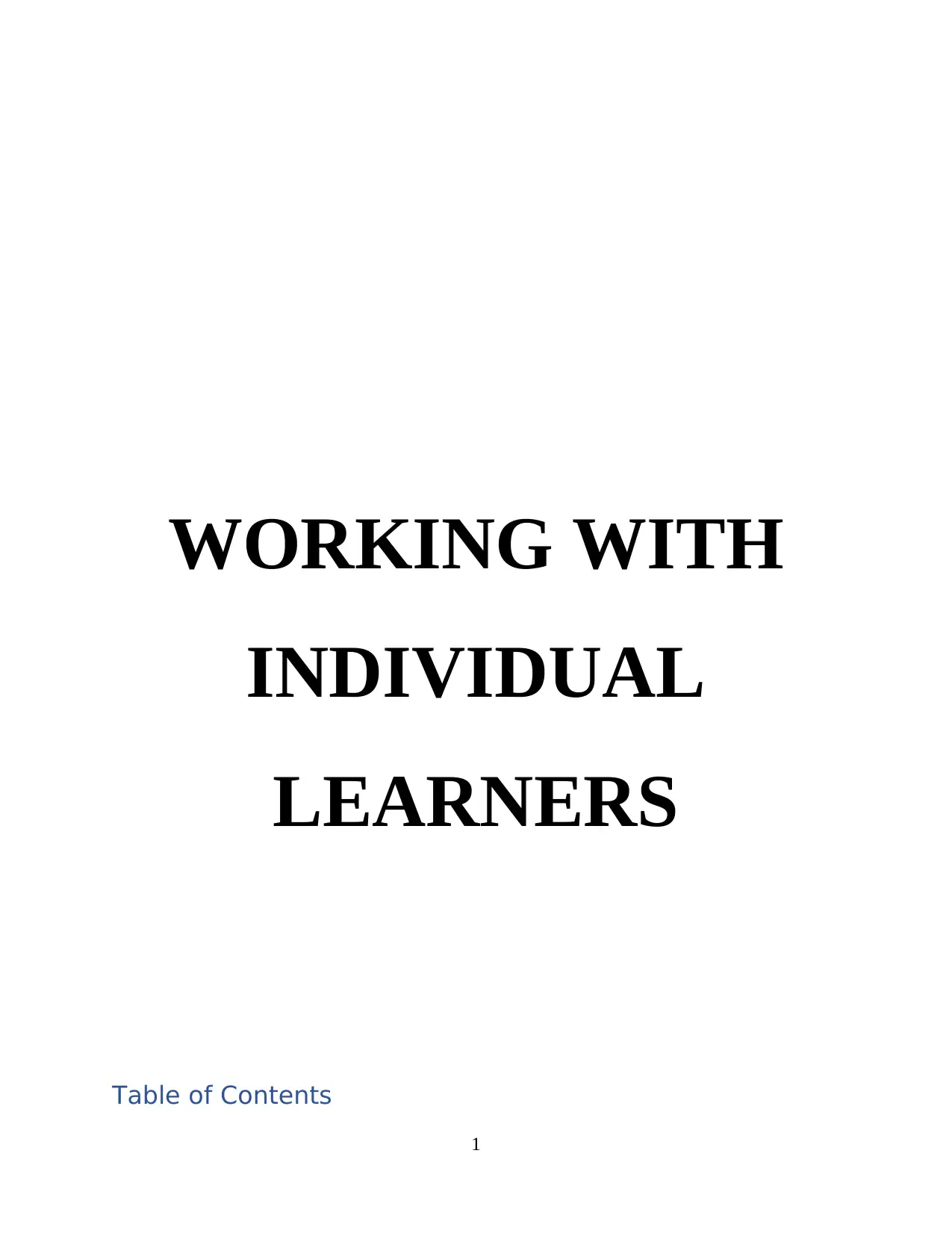
WORKING WITH
INDIVIDUAL
LEARNERS
Table of Contents
1
INDIVIDUAL
LEARNERS
Table of Contents
1
Paraphrase This Document
Need a fresh take? Get an instant paraphrase of this document with our AI Paraphraser
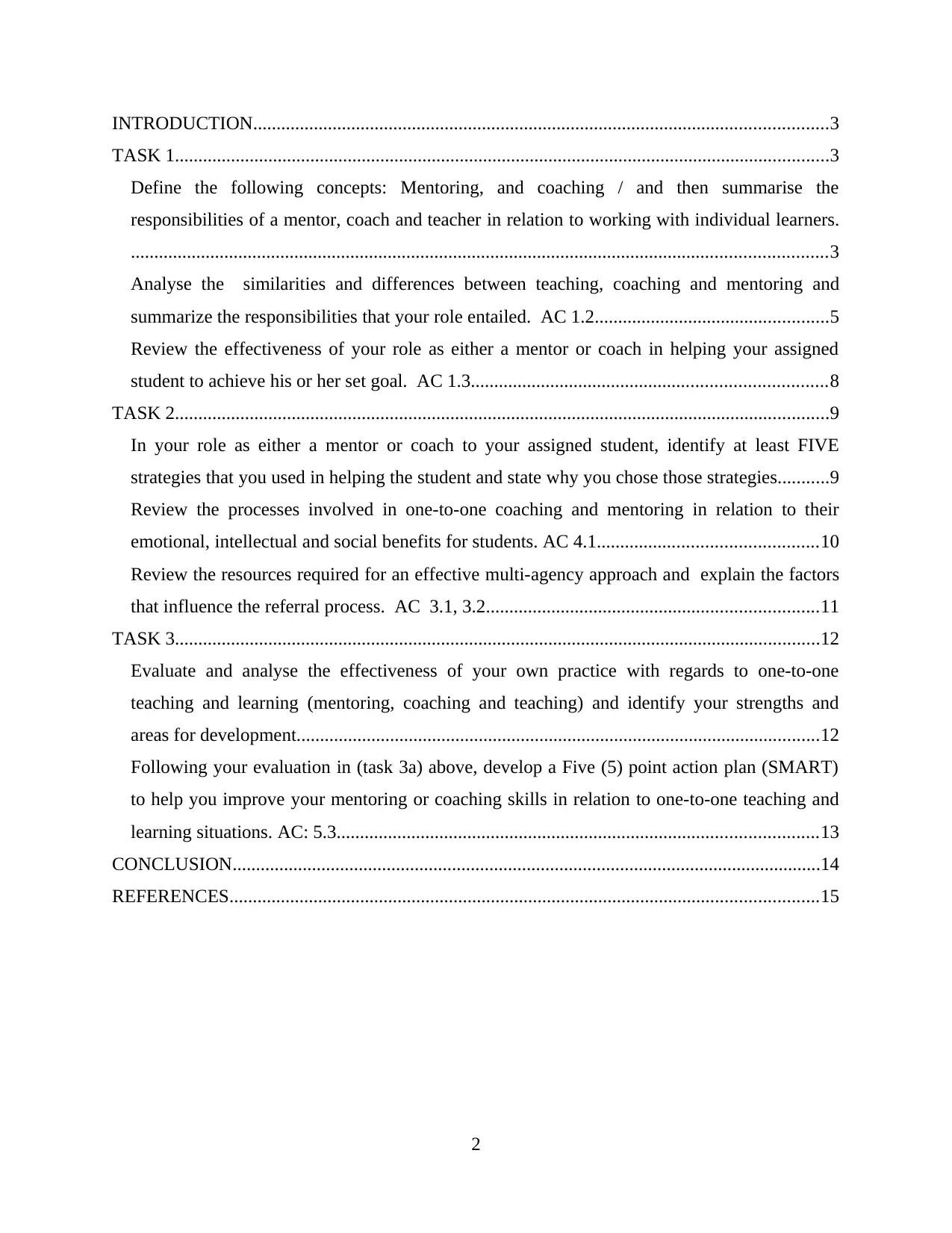
INTRODUCTION...........................................................................................................................3
TASK 1............................................................................................................................................3
Define the following concepts: Mentoring, and coaching / and then summarise the
responsibilities of a mentor, coach and teacher in relation to working with individual learners.
.....................................................................................................................................................3
Analyse the similarities and differences between teaching, coaching and mentoring and
summarize the responsibilities that your role entailed. AC 1.2..................................................5
Review the effectiveness of your role as either a mentor or coach in helping your assigned
student to achieve his or her set goal. AC 1.3............................................................................8
TASK 2............................................................................................................................................9
In your role as either a mentor or coach to your assigned student, identify at least FIVE
strategies that you used in helping the student and state why you chose those strategies...........9
Review the processes involved in one-to-one coaching and mentoring in relation to their
emotional, intellectual and social benefits for students. AC 4.1...............................................10
Review the resources required for an effective multi-agency approach and explain the factors
that influence the referral process. AC 3.1, 3.2.......................................................................11
TASK 3..........................................................................................................................................12
Evaluate and analyse the effectiveness of your own practice with regards to one-to-one
teaching and learning (mentoring, coaching and teaching) and identify your strengths and
areas for development................................................................................................................12
Following your evaluation in (task 3a) above, develop a Five (5) point action plan (SMART)
to help you improve your mentoring or coaching skills in relation to one-to-one teaching and
learning situations. AC: 5.3.......................................................................................................13
CONCLUSION..............................................................................................................................14
REFERENCES..............................................................................................................................15
2
TASK 1............................................................................................................................................3
Define the following concepts: Mentoring, and coaching / and then summarise the
responsibilities of a mentor, coach and teacher in relation to working with individual learners.
.....................................................................................................................................................3
Analyse the similarities and differences between teaching, coaching and mentoring and
summarize the responsibilities that your role entailed. AC 1.2..................................................5
Review the effectiveness of your role as either a mentor or coach in helping your assigned
student to achieve his or her set goal. AC 1.3............................................................................8
TASK 2............................................................................................................................................9
In your role as either a mentor or coach to your assigned student, identify at least FIVE
strategies that you used in helping the student and state why you chose those strategies...........9
Review the processes involved in one-to-one coaching and mentoring in relation to their
emotional, intellectual and social benefits for students. AC 4.1...............................................10
Review the resources required for an effective multi-agency approach and explain the factors
that influence the referral process. AC 3.1, 3.2.......................................................................11
TASK 3..........................................................................................................................................12
Evaluate and analyse the effectiveness of your own practice with regards to one-to-one
teaching and learning (mentoring, coaching and teaching) and identify your strengths and
areas for development................................................................................................................12
Following your evaluation in (task 3a) above, develop a Five (5) point action plan (SMART)
to help you improve your mentoring or coaching skills in relation to one-to-one teaching and
learning situations. AC: 5.3.......................................................................................................13
CONCLUSION..............................................................................................................................14
REFERENCES..............................................................................................................................15
2
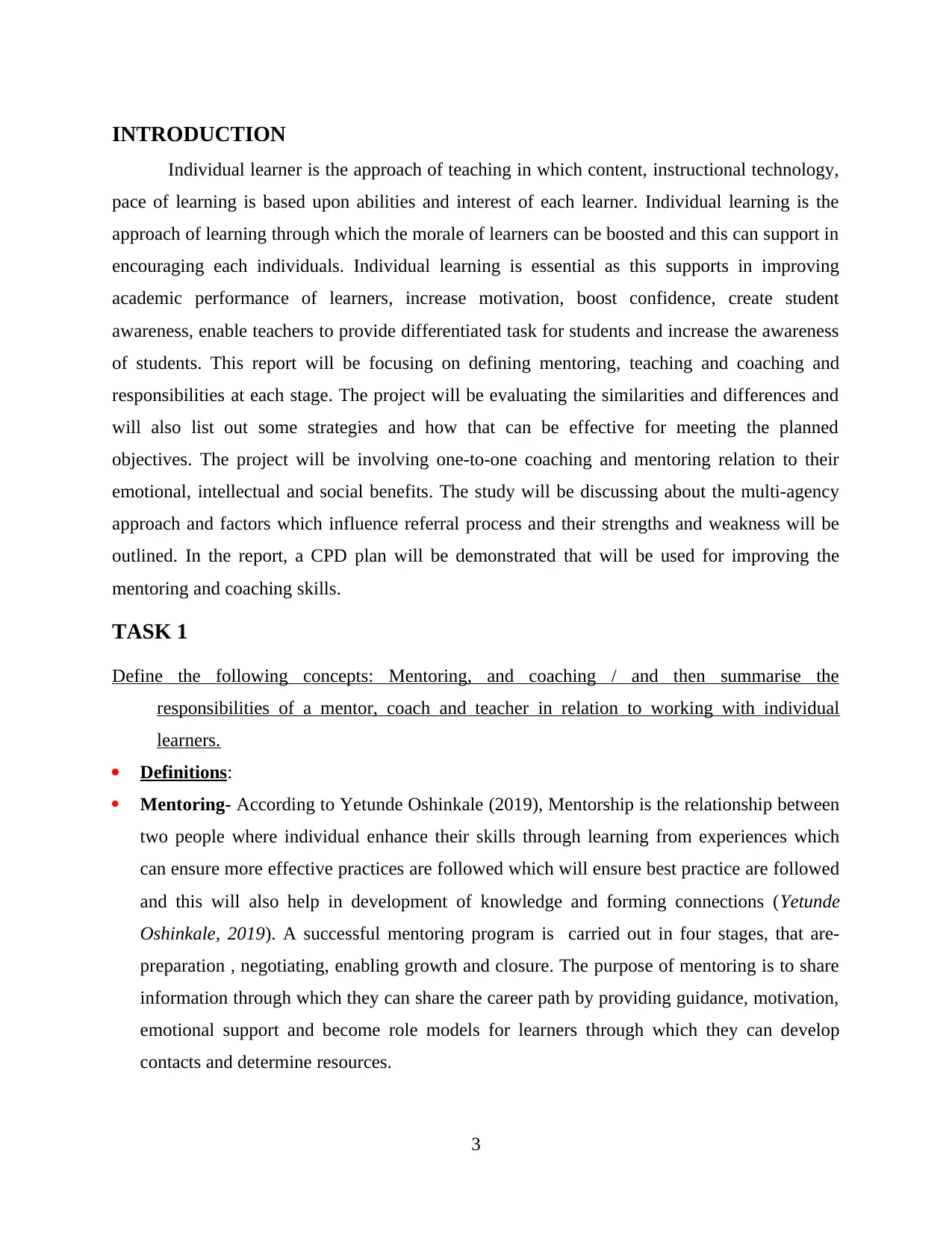
INTRODUCTION
Individual learner is the approach of teaching in which content, instructional technology,
pace of learning is based upon abilities and interest of each learner. Individual learning is the
approach of learning through which the morale of learners can be boosted and this can support in
encouraging each individuals. Individual learning is essential as this supports in improving
academic performance of learners, increase motivation, boost confidence, create student
awareness, enable teachers to provide differentiated task for students and increase the awareness
of students. This report will be focusing on defining mentoring, teaching and coaching and
responsibilities at each stage. The project will be evaluating the similarities and differences and
will also list out some strategies and how that can be effective for meeting the planned
objectives. The project will be involving one-to-one coaching and mentoring relation to their
emotional, intellectual and social benefits. The study will be discussing about the multi-agency
approach and factors which influence referral process and their strengths and weakness will be
outlined. In the report, a CPD plan will be demonstrated that will be used for improving the
mentoring and coaching skills.
TASK 1
Define the following concepts: Mentoring, and coaching / and then summarise the
responsibilities of a mentor, coach and teacher in relation to working with individual
learners.
Definitions:
Mentoring- According to Yetunde Oshinkale (2019), Mentorship is the relationship between
two people where individual enhance their skills through learning from experiences which
can ensure more effective practices are followed which will ensure best practice are followed
and this will also help in development of knowledge and forming connections (Yetunde
Oshinkale, 2019). A successful mentoring program is carried out in four stages, that are-
preparation , negotiating, enabling growth and closure. The purpose of mentoring is to share
information through which they can share the career path by providing guidance, motivation,
emotional support and become role models for learners through which they can develop
contacts and determine resources.
3
Individual learner is the approach of teaching in which content, instructional technology,
pace of learning is based upon abilities and interest of each learner. Individual learning is the
approach of learning through which the morale of learners can be boosted and this can support in
encouraging each individuals. Individual learning is essential as this supports in improving
academic performance of learners, increase motivation, boost confidence, create student
awareness, enable teachers to provide differentiated task for students and increase the awareness
of students. This report will be focusing on defining mentoring, teaching and coaching and
responsibilities at each stage. The project will be evaluating the similarities and differences and
will also list out some strategies and how that can be effective for meeting the planned
objectives. The project will be involving one-to-one coaching and mentoring relation to their
emotional, intellectual and social benefits. The study will be discussing about the multi-agency
approach and factors which influence referral process and their strengths and weakness will be
outlined. In the report, a CPD plan will be demonstrated that will be used for improving the
mentoring and coaching skills.
TASK 1
Define the following concepts: Mentoring, and coaching / and then summarise the
responsibilities of a mentor, coach and teacher in relation to working with individual
learners.
Definitions:
Mentoring- According to Yetunde Oshinkale (2019), Mentorship is the relationship between
two people where individual enhance their skills through learning from experiences which
can ensure more effective practices are followed which will ensure best practice are followed
and this will also help in development of knowledge and forming connections (Yetunde
Oshinkale, 2019). A successful mentoring program is carried out in four stages, that are-
preparation , negotiating, enabling growth and closure. The purpose of mentoring is to share
information through which they can share the career path by providing guidance, motivation,
emotional support and become role models for learners through which they can develop
contacts and determine resources.
3
⊘ This is a preview!⊘
Do you want full access?
Subscribe today to unlock all pages.

Trusted by 1+ million students worldwide
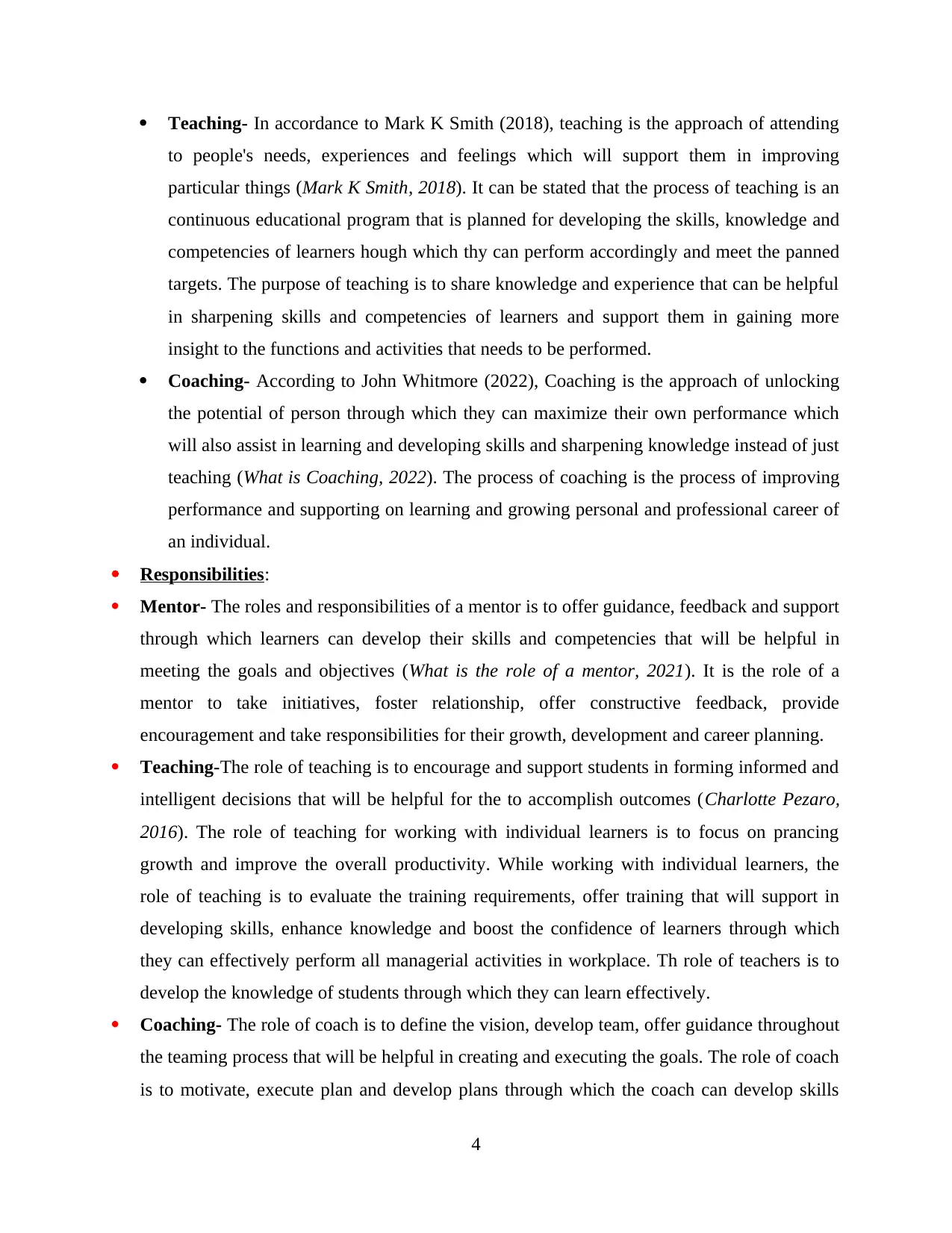
Teaching- In accordance to Mark K Smith (2018), teaching is the approach of attending
to people's needs, experiences and feelings which will support them in improving
particular things (Mark K Smith, 2018). It can be stated that the process of teaching is an
continuous educational program that is planned for developing the skills, knowledge and
competencies of learners hough which thy can perform accordingly and meet the panned
targets. The purpose of teaching is to share knowledge and experience that can be helpful
in sharpening skills and competencies of learners and support them in gaining more
insight to the functions and activities that needs to be performed.
Coaching- According to John Whitmore (2022), Coaching is the approach of unlocking
the potential of person through which they can maximize their own performance which
will also assist in learning and developing skills and sharpening knowledge instead of just
teaching (What is Coaching, 2022). The process of coaching is the process of improving
performance and supporting on learning and growing personal and professional career of
an individual.
Responsibilities:
Mentor- The roles and responsibilities of a mentor is to offer guidance, feedback and support
through which learners can develop their skills and competencies that will be helpful in
meeting the goals and objectives (What is the role of a mentor, 2021). It is the role of a
mentor to take initiatives, foster relationship, offer constructive feedback, provide
encouragement and take responsibilities for their growth, development and career planning.
Teaching-The role of teaching is to encourage and support students in forming informed and
intelligent decisions that will be helpful for the to accomplish outcomes (Charlotte Pezaro,
2016). The role of teaching for working with individual learners is to focus on prancing
growth and improve the overall productivity. While working with individual learners, the
role of teaching is to evaluate the training requirements, offer training that will support in
developing skills, enhance knowledge and boost the confidence of learners through which
they can effectively perform all managerial activities in workplace. Th role of teachers is to
develop the knowledge of students through which they can learn effectively.
Coaching- The role of coach is to define the vision, develop team, offer guidance throughout
the teaming process that will be helpful in creating and executing the goals. The role of coach
is to motivate, execute plan and develop plans through which the coach can develop skills
4
to people's needs, experiences and feelings which will support them in improving
particular things (Mark K Smith, 2018). It can be stated that the process of teaching is an
continuous educational program that is planned for developing the skills, knowledge and
competencies of learners hough which thy can perform accordingly and meet the panned
targets. The purpose of teaching is to share knowledge and experience that can be helpful
in sharpening skills and competencies of learners and support them in gaining more
insight to the functions and activities that needs to be performed.
Coaching- According to John Whitmore (2022), Coaching is the approach of unlocking
the potential of person through which they can maximize their own performance which
will also assist in learning and developing skills and sharpening knowledge instead of just
teaching (What is Coaching, 2022). The process of coaching is the process of improving
performance and supporting on learning and growing personal and professional career of
an individual.
Responsibilities:
Mentor- The roles and responsibilities of a mentor is to offer guidance, feedback and support
through which learners can develop their skills and competencies that will be helpful in
meeting the goals and objectives (What is the role of a mentor, 2021). It is the role of a
mentor to take initiatives, foster relationship, offer constructive feedback, provide
encouragement and take responsibilities for their growth, development and career planning.
Teaching-The role of teaching is to encourage and support students in forming informed and
intelligent decisions that will be helpful for the to accomplish outcomes (Charlotte Pezaro,
2016). The role of teaching for working with individual learners is to focus on prancing
growth and improve the overall productivity. While working with individual learners, the
role of teaching is to evaluate the training requirements, offer training that will support in
developing skills, enhance knowledge and boost the confidence of learners through which
they can effectively perform all managerial activities in workplace. Th role of teachers is to
develop the knowledge of students through which they can learn effectively.
Coaching- The role of coach is to define the vision, develop team, offer guidance throughout
the teaming process that will be helpful in creating and executing the goals. The role of coach
is to motivate, execute plan and develop plans through which the coach can develop skills
4
Paraphrase This Document
Need a fresh take? Get an instant paraphrase of this document with our AI Paraphraser
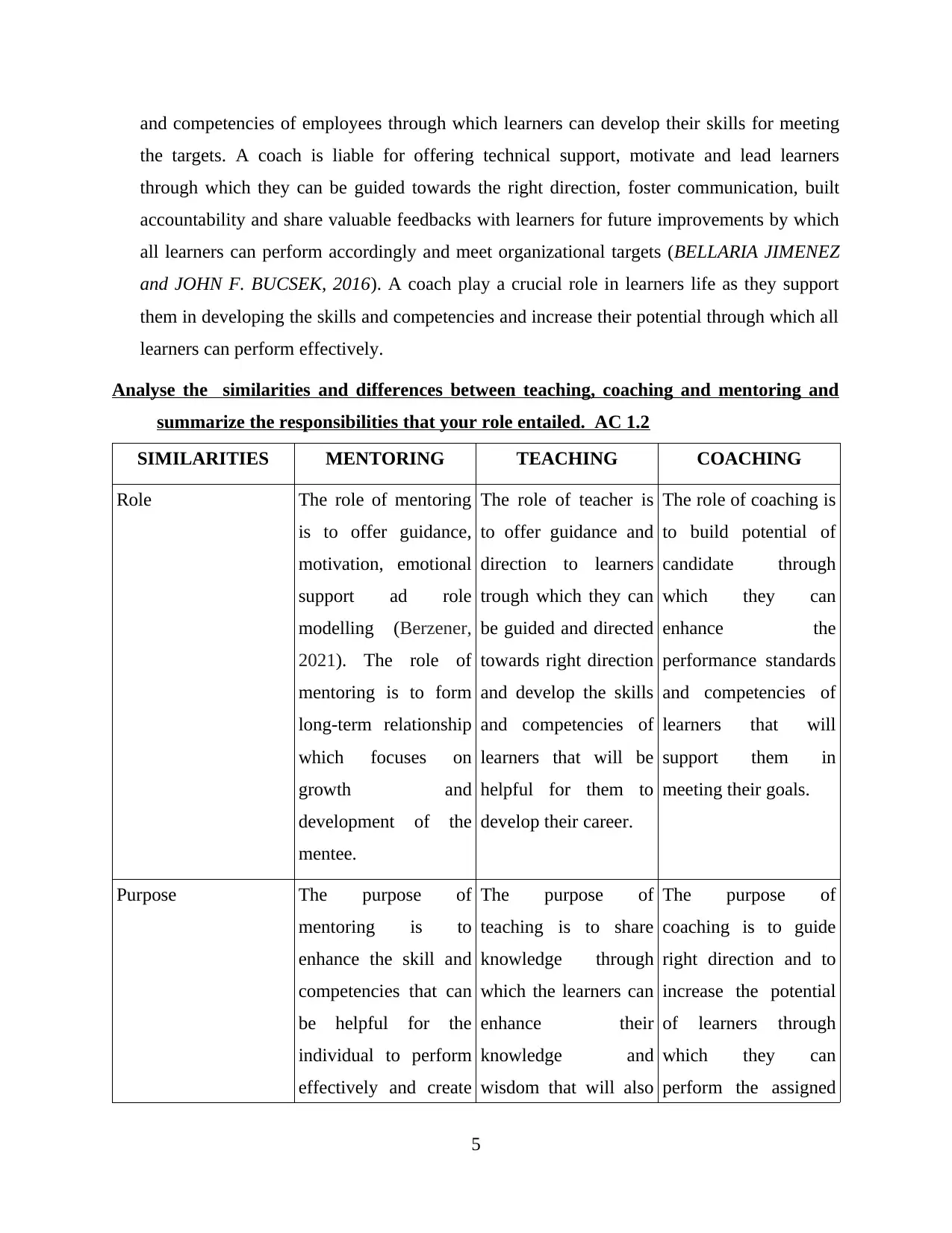
and competencies of employees through which learners can develop their skills for meeting
the targets. A coach is liable for offering technical support, motivate and lead learners
through which they can be guided towards the right direction, foster communication, built
accountability and share valuable feedbacks with learners for future improvements by which
all learners can perform accordingly and meet organizational targets (BELLARIA JIMENEZ
and JOHN F. BUCSEK, 2016). A coach play a crucial role in learners life as they support
them in developing the skills and competencies and increase their potential through which all
learners can perform effectively.
Analyse the similarities and differences between teaching, coaching and mentoring and
summarize the responsibilities that your role entailed. AC 1.2
SIMILARITIES MENTORING TEACHING COACHING
Role The role of mentoring
is to offer guidance,
motivation, emotional
support ad role
modelling (Berzener,
2021). The role of
mentoring is to form
long-term relationship
which focuses on
growth and
development of the
mentee.
The role of teacher is
to offer guidance and
direction to learners
trough which they can
be guided and directed
towards right direction
and develop the skills
and competencies of
learners that will be
helpful for them to
develop their career.
The role of coaching is
to build potential of
candidate through
which they can
enhance the
performance standards
and competencies of
learners that will
support them in
meeting their goals.
Purpose The purpose of
mentoring is to
enhance the skill and
competencies that can
be helpful for the
individual to perform
effectively and create
The purpose of
teaching is to share
knowledge through
which the learners can
enhance their
knowledge and
wisdom that will also
The purpose of
coaching is to guide
right direction and to
increase the potential
of learners through
which they can
perform the assigned
5
the targets. A coach is liable for offering technical support, motivate and lead learners
through which they can be guided towards the right direction, foster communication, built
accountability and share valuable feedbacks with learners for future improvements by which
all learners can perform accordingly and meet organizational targets (BELLARIA JIMENEZ
and JOHN F. BUCSEK, 2016). A coach play a crucial role in learners life as they support
them in developing the skills and competencies and increase their potential through which all
learners can perform effectively.
Analyse the similarities and differences between teaching, coaching and mentoring and
summarize the responsibilities that your role entailed. AC 1.2
SIMILARITIES MENTORING TEACHING COACHING
Role The role of mentoring
is to offer guidance,
motivation, emotional
support ad role
modelling (Berzener,
2021). The role of
mentoring is to form
long-term relationship
which focuses on
growth and
development of the
mentee.
The role of teacher is
to offer guidance and
direction to learners
trough which they can
be guided and directed
towards right direction
and develop the skills
and competencies of
learners that will be
helpful for them to
develop their career.
The role of coaching is
to build potential of
candidate through
which they can
enhance the
performance standards
and competencies of
learners that will
support them in
meeting their goals.
Purpose The purpose of
mentoring is to
enhance the skill and
competencies that can
be helpful for the
individual to perform
effectively and create
The purpose of
teaching is to share
knowledge through
which the learners can
enhance their
knowledge and
wisdom that will also
The purpose of
coaching is to guide
right direction and to
increase the potential
of learners through
which they can
perform the assigned
5
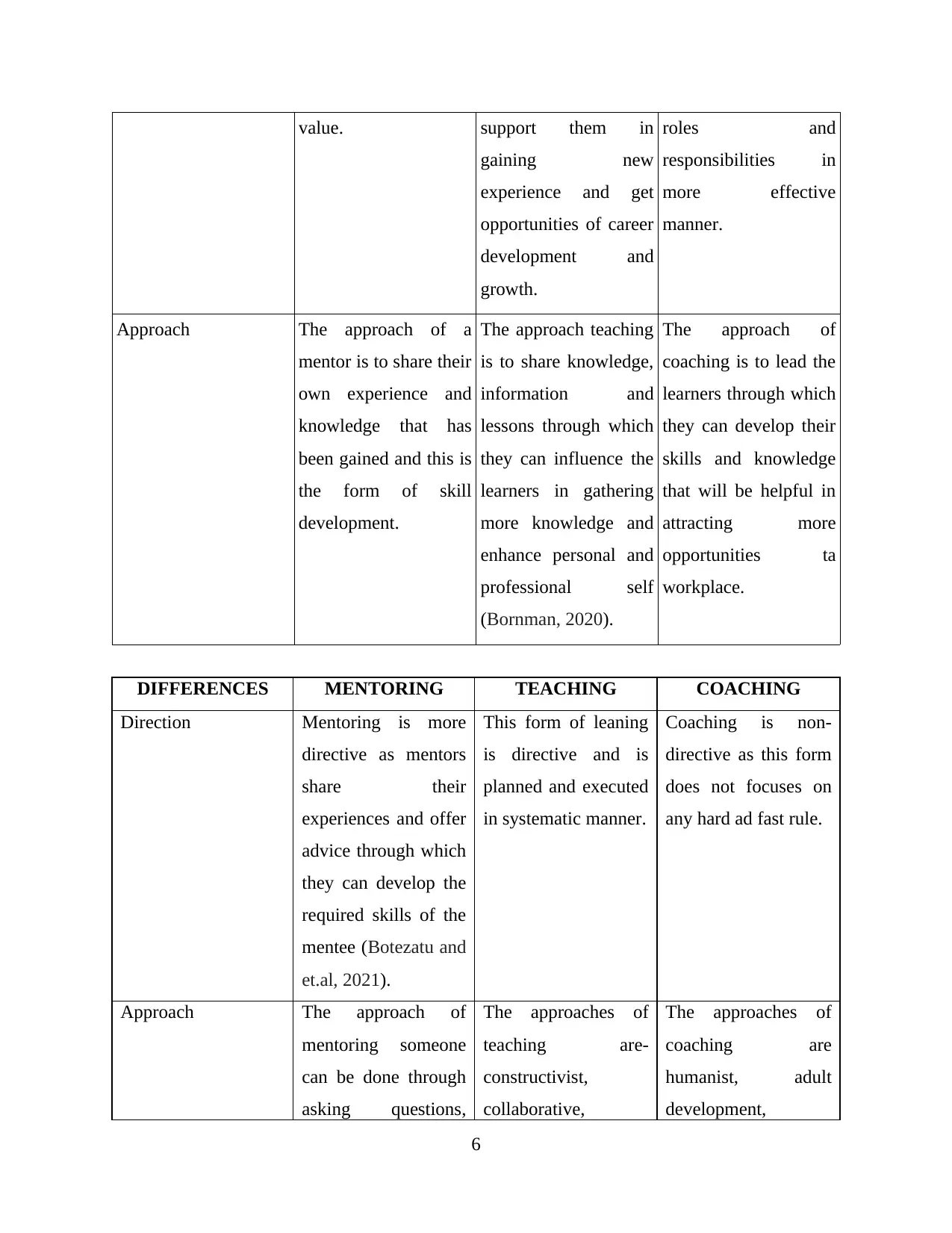
value. support them in
gaining new
experience and get
opportunities of career
development and
growth.
roles and
responsibilities in
more effective
manner.
Approach The approach of a
mentor is to share their
own experience and
knowledge that has
been gained and this is
the form of skill
development.
The approach teaching
is to share knowledge,
information and
lessons through which
they can influence the
learners in gathering
more knowledge and
enhance personal and
professional self
(Bornman, 2020).
The approach of
coaching is to lead the
learners through which
they can develop their
skills and knowledge
that will be helpful in
attracting more
opportunities ta
workplace.
DIFFERENCES MENTORING TEACHING COACHING
Direction Mentoring is more
directive as mentors
share their
experiences and offer
advice through which
they can develop the
required skills of the
mentee (Botezatu and
et.al, 2021).
This form of leaning
is directive and is
planned and executed
in systematic manner.
Coaching is non-
directive as this form
does not focuses on
any hard ad fast rule.
Approach The approach of
mentoring someone
can be done through
asking questions,
The approaches of
teaching are-
constructivist,
collaborative,
The approaches of
coaching are
humanist, adult
development,
6
gaining new
experience and get
opportunities of career
development and
growth.
roles and
responsibilities in
more effective
manner.
Approach The approach of a
mentor is to share their
own experience and
knowledge that has
been gained and this is
the form of skill
development.
The approach teaching
is to share knowledge,
information and
lessons through which
they can influence the
learners in gathering
more knowledge and
enhance personal and
professional self
(Bornman, 2020).
The approach of
coaching is to lead the
learners through which
they can develop their
skills and knowledge
that will be helpful in
attracting more
opportunities ta
workplace.
DIFFERENCES MENTORING TEACHING COACHING
Direction Mentoring is more
directive as mentors
share their
experiences and offer
advice through which
they can develop the
required skills of the
mentee (Botezatu and
et.al, 2021).
This form of leaning
is directive and is
planned and executed
in systematic manner.
Coaching is non-
directive as this form
does not focuses on
any hard ad fast rule.
Approach The approach of
mentoring someone
can be done through
asking questions,
The approaches of
teaching are-
constructivist,
collaborative,
The approaches of
coaching are
humanist, adult
development,
6
⊘ This is a preview!⊘
Do you want full access?
Subscribe today to unlock all pages.

Trusted by 1+ million students worldwide
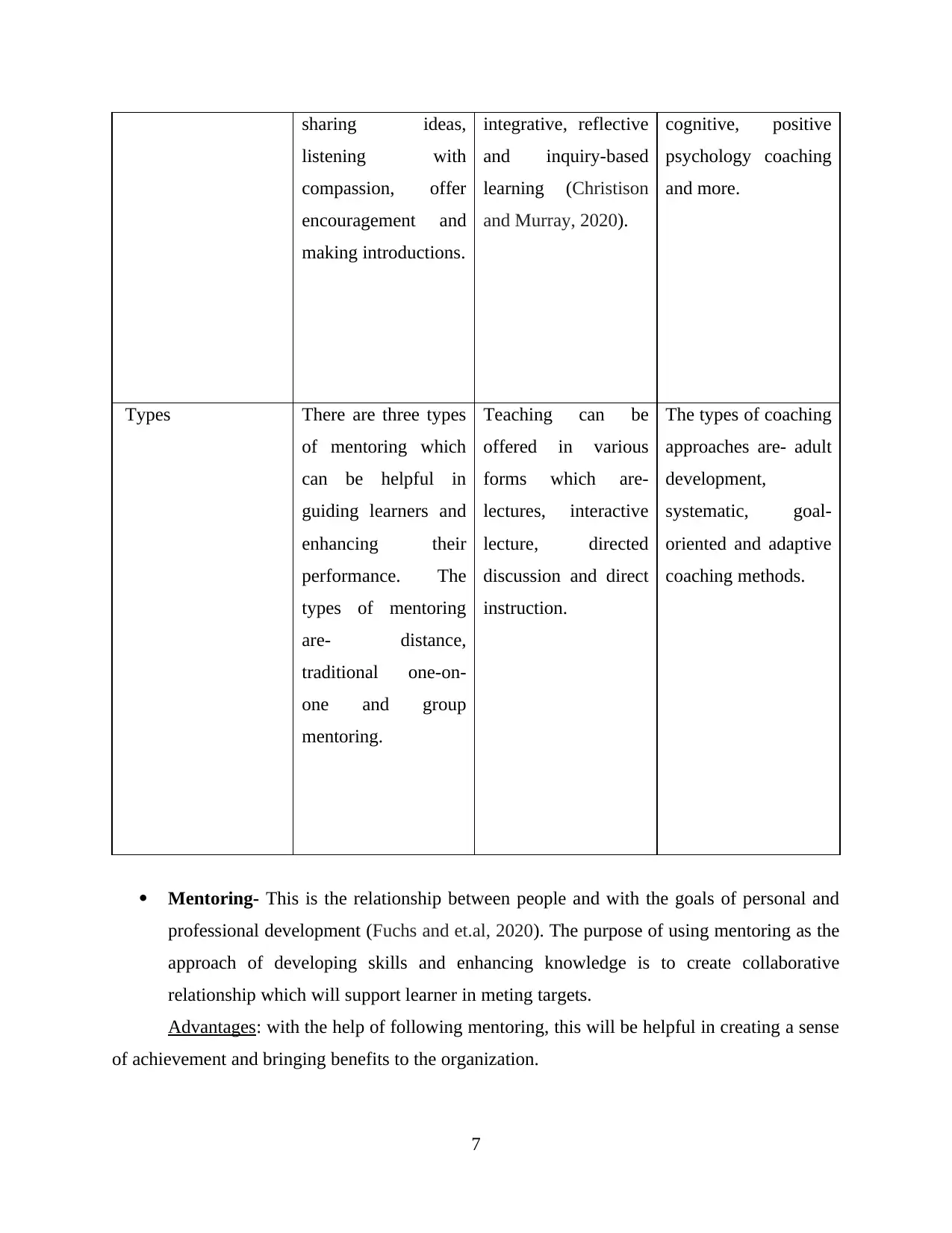
sharing ideas,
listening with
compassion, offer
encouragement and
making introductions.
integrative, reflective
and inquiry-based
learning (Christison
and Murray, 2020).
cognitive, positive
psychology coaching
and more.
Types There are three types
of mentoring which
can be helpful in
guiding learners and
enhancing their
performance. The
types of mentoring
are- distance,
traditional one-on-
one and group
mentoring.
Teaching can be
offered in various
forms which are-
lectures, interactive
lecture, directed
discussion and direct
instruction.
The types of coaching
approaches are- adult
development,
systematic, goal-
oriented and adaptive
coaching methods.
Mentoring- This is the relationship between people and with the goals of personal and
professional development (Fuchs and et.al, 2020). The purpose of using mentoring as the
approach of developing skills and enhancing knowledge is to create collaborative
relationship which will support learner in meting targets.
Advantages: with the help of following mentoring, this will be helpful in creating a sense
of achievement and bringing benefits to the organization.
7
listening with
compassion, offer
encouragement and
making introductions.
integrative, reflective
and inquiry-based
learning (Christison
and Murray, 2020).
cognitive, positive
psychology coaching
and more.
Types There are three types
of mentoring which
can be helpful in
guiding learners and
enhancing their
performance. The
types of mentoring
are- distance,
traditional one-on-
one and group
mentoring.
Teaching can be
offered in various
forms which are-
lectures, interactive
lecture, directed
discussion and direct
instruction.
The types of coaching
approaches are- adult
development,
systematic, goal-
oriented and adaptive
coaching methods.
Mentoring- This is the relationship between people and with the goals of personal and
professional development (Fuchs and et.al, 2020). The purpose of using mentoring as the
approach of developing skills and enhancing knowledge is to create collaborative
relationship which will support learner in meting targets.
Advantages: with the help of following mentoring, this will be helpful in creating a sense
of achievement and bringing benefits to the organization.
7
Paraphrase This Document
Need a fresh take? Get an instant paraphrase of this document with our AI Paraphraser
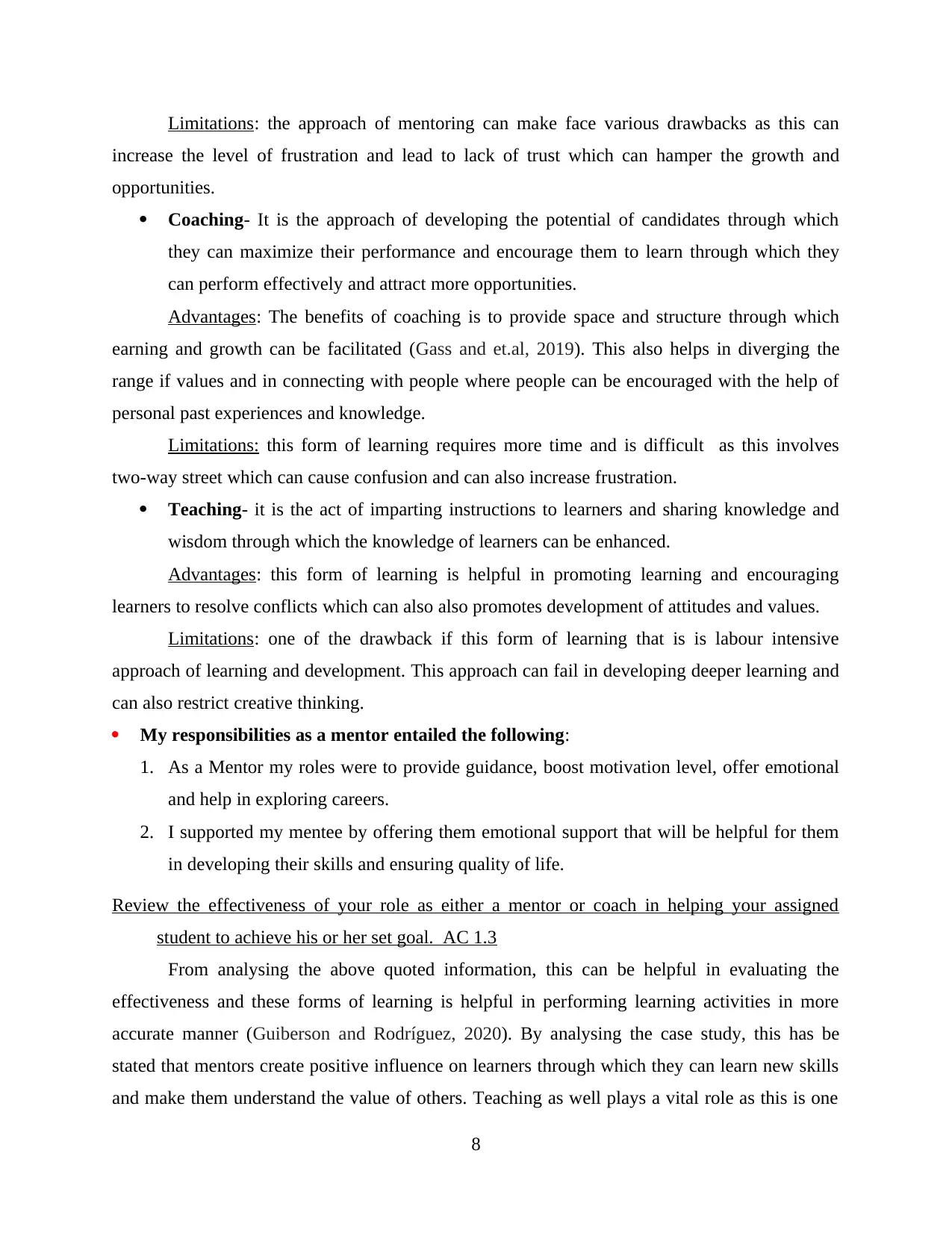
Limitations: the approach of mentoring can make face various drawbacks as this can
increase the level of frustration and lead to lack of trust which can hamper the growth and
opportunities.
Coaching- It is the approach of developing the potential of candidates through which
they can maximize their performance and encourage them to learn through which they
can perform effectively and attract more opportunities.
Advantages: The benefits of coaching is to provide space and structure through which
earning and growth can be facilitated (Gass and et.al, 2019). This also helps in diverging the
range if values and in connecting with people where people can be encouraged with the help of
personal past experiences and knowledge.
Limitations: this form of learning requires more time and is difficult as this involves
two-way street which can cause confusion and can also increase frustration.
Teaching- it is the act of imparting instructions to learners and sharing knowledge and
wisdom through which the knowledge of learners can be enhanced.
Advantages: this form of learning is helpful in promoting learning and encouraging
learners to resolve conflicts which can also also promotes development of attitudes and values.
Limitations: one of the drawback if this form of learning that is is labour intensive
approach of learning and development. This approach can fail in developing deeper learning and
can also restrict creative thinking.
My responsibilities as a mentor entailed the following:
1. As a Mentor my roles were to provide guidance, boost motivation level, offer emotional
and help in exploring careers.
2. I supported my mentee by offering them emotional support that will be helpful for them
in developing their skills and ensuring quality of life.
Review the effectiveness of your role as either a mentor or coach in helping your assigned
student to achieve his or her set goal. AC 1.3
From analysing the above quoted information, this can be helpful in evaluating the
effectiveness and these forms of learning is helpful in performing learning activities in more
accurate manner (Guiberson and Rodríguez, 2020). By analysing the case study, this has be
stated that mentors create positive influence on learners through which they can learn new skills
and make them understand the value of others. Teaching as well plays a vital role as this is one
8
increase the level of frustration and lead to lack of trust which can hamper the growth and
opportunities.
Coaching- It is the approach of developing the potential of candidates through which
they can maximize their performance and encourage them to learn through which they
can perform effectively and attract more opportunities.
Advantages: The benefits of coaching is to provide space and structure through which
earning and growth can be facilitated (Gass and et.al, 2019). This also helps in diverging the
range if values and in connecting with people where people can be encouraged with the help of
personal past experiences and knowledge.
Limitations: this form of learning requires more time and is difficult as this involves
two-way street which can cause confusion and can also increase frustration.
Teaching- it is the act of imparting instructions to learners and sharing knowledge and
wisdom through which the knowledge of learners can be enhanced.
Advantages: this form of learning is helpful in promoting learning and encouraging
learners to resolve conflicts which can also also promotes development of attitudes and values.
Limitations: one of the drawback if this form of learning that is is labour intensive
approach of learning and development. This approach can fail in developing deeper learning and
can also restrict creative thinking.
My responsibilities as a mentor entailed the following:
1. As a Mentor my roles were to provide guidance, boost motivation level, offer emotional
and help in exploring careers.
2. I supported my mentee by offering them emotional support that will be helpful for them
in developing their skills and ensuring quality of life.
Review the effectiveness of your role as either a mentor or coach in helping your assigned
student to achieve his or her set goal. AC 1.3
From analysing the above quoted information, this can be helpful in evaluating the
effectiveness and these forms of learning is helpful in performing learning activities in more
accurate manner (Guiberson and Rodríguez, 2020). By analysing the case study, this has be
stated that mentors create positive influence on learners through which they can learn new skills
and make them understand the value of others. Teaching as well plays a vital role as this is one
8
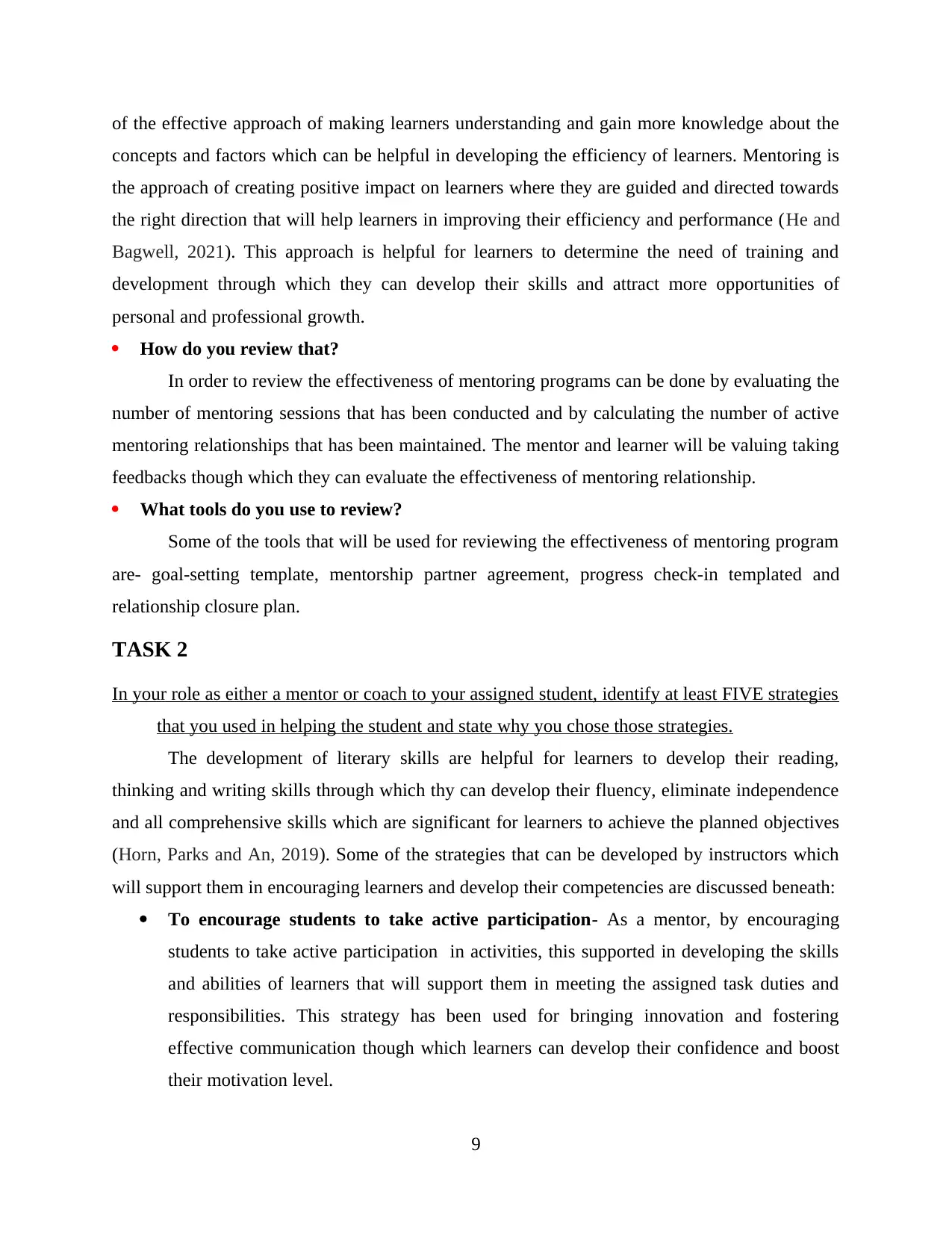
of the effective approach of making learners understanding and gain more knowledge about the
concepts and factors which can be helpful in developing the efficiency of learners. Mentoring is
the approach of creating positive impact on learners where they are guided and directed towards
the right direction that will help learners in improving their efficiency and performance (He and
Bagwell, 2021). This approach is helpful for learners to determine the need of training and
development through which they can develop their skills and attract more opportunities of
personal and professional growth.
How do you review that?
In order to review the effectiveness of mentoring programs can be done by evaluating the
number of mentoring sessions that has been conducted and by calculating the number of active
mentoring relationships that has been maintained. The mentor and learner will be valuing taking
feedbacks though which they can evaluate the effectiveness of mentoring relationship.
What tools do you use to review?
Some of the tools that will be used for reviewing the effectiveness of mentoring program
are- goal-setting template, mentorship partner agreement, progress check-in templated and
relationship closure plan.
TASK 2
In your role as either a mentor or coach to your assigned student, identify at least FIVE strategies
that you used in helping the student and state why you chose those strategies.
The development of literary skills are helpful for learners to develop their reading,
thinking and writing skills through which thy can develop their fluency, eliminate independence
and all comprehensive skills which are significant for learners to achieve the planned objectives
(Horn, Parks and An, 2019). Some of the strategies that can be developed by instructors which
will support them in encouraging learners and develop their competencies are discussed beneath:
To encourage students to take active participation- As a mentor, by encouraging
students to take active participation in activities, this supported in developing the skills
and abilities of learners that will support them in meeting the assigned task duties and
responsibilities. This strategy has been used for bringing innovation and fostering
effective communication though which learners can develop their confidence and boost
their motivation level.
9
concepts and factors which can be helpful in developing the efficiency of learners. Mentoring is
the approach of creating positive impact on learners where they are guided and directed towards
the right direction that will help learners in improving their efficiency and performance (He and
Bagwell, 2021). This approach is helpful for learners to determine the need of training and
development through which they can develop their skills and attract more opportunities of
personal and professional growth.
How do you review that?
In order to review the effectiveness of mentoring programs can be done by evaluating the
number of mentoring sessions that has been conducted and by calculating the number of active
mentoring relationships that has been maintained. The mentor and learner will be valuing taking
feedbacks though which they can evaluate the effectiveness of mentoring relationship.
What tools do you use to review?
Some of the tools that will be used for reviewing the effectiveness of mentoring program
are- goal-setting template, mentorship partner agreement, progress check-in templated and
relationship closure plan.
TASK 2
In your role as either a mentor or coach to your assigned student, identify at least FIVE strategies
that you used in helping the student and state why you chose those strategies.
The development of literary skills are helpful for learners to develop their reading,
thinking and writing skills through which thy can develop their fluency, eliminate independence
and all comprehensive skills which are significant for learners to achieve the planned objectives
(Horn, Parks and An, 2019). Some of the strategies that can be developed by instructors which
will support them in encouraging learners and develop their competencies are discussed beneath:
To encourage students to take active participation- As a mentor, by encouraging
students to take active participation in activities, this supported in developing the skills
and abilities of learners that will support them in meeting the assigned task duties and
responsibilities. This strategy has been used for bringing innovation and fostering
effective communication though which learners can develop their confidence and boost
their motivation level.
9
⊘ This is a preview!⊘
Do you want full access?
Subscribe today to unlock all pages.

Trusted by 1+ million students worldwide
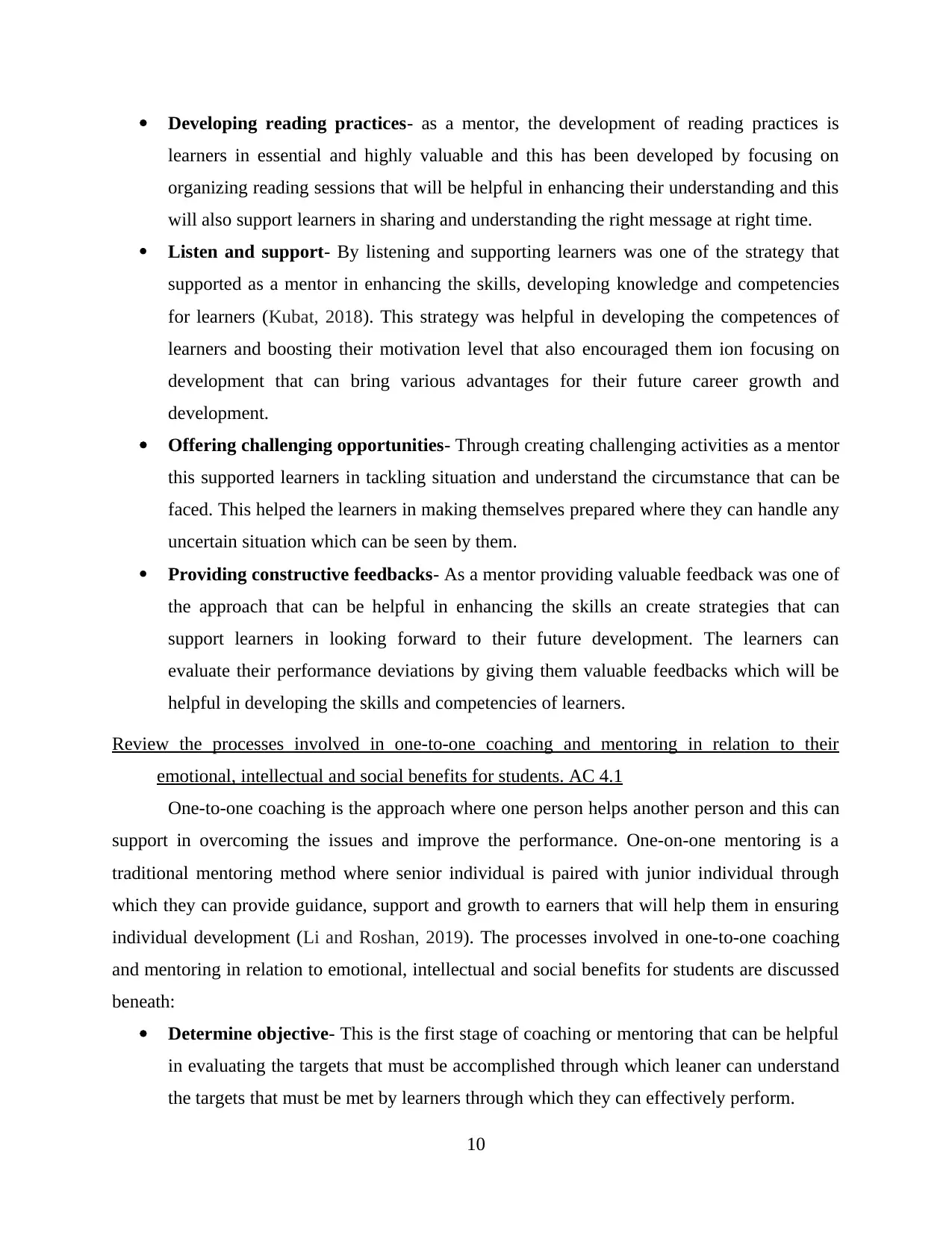
Developing reading practices- as a mentor, the development of reading practices is
learners in essential and highly valuable and this has been developed by focusing on
organizing reading sessions that will be helpful in enhancing their understanding and this
will also support learners in sharing and understanding the right message at right time.
Listen and support- By listening and supporting learners was one of the strategy that
supported as a mentor in enhancing the skills, developing knowledge and competencies
for learners (Kubat, 2018). This strategy was helpful in developing the competences of
learners and boosting their motivation level that also encouraged them ion focusing on
development that can bring various advantages for their future career growth and
development.
Offering challenging opportunities- Through creating challenging activities as a mentor
this supported learners in tackling situation and understand the circumstance that can be
faced. This helped the learners in making themselves prepared where they can handle any
uncertain situation which can be seen by them.
Providing constructive feedbacks- As a mentor providing valuable feedback was one of
the approach that can be helpful in enhancing the skills an create strategies that can
support learners in looking forward to their future development. The learners can
evaluate their performance deviations by giving them valuable feedbacks which will be
helpful in developing the skills and competencies of learners.
Review the processes involved in one-to-one coaching and mentoring in relation to their
emotional, intellectual and social benefits for students. AC 4.1
One-to-one coaching is the approach where one person helps another person and this can
support in overcoming the issues and improve the performance. One-on-one mentoring is a
traditional mentoring method where senior individual is paired with junior individual through
which they can provide guidance, support and growth to earners that will help them in ensuring
individual development (Li and Roshan, 2019). The processes involved in one-to-one coaching
and mentoring in relation to emotional, intellectual and social benefits for students are discussed
beneath:
Determine objective- This is the first stage of coaching or mentoring that can be helpful
in evaluating the targets that must be accomplished through which leaner can understand
the targets that must be met by learners through which they can effectively perform.
10
learners in essential and highly valuable and this has been developed by focusing on
organizing reading sessions that will be helpful in enhancing their understanding and this
will also support learners in sharing and understanding the right message at right time.
Listen and support- By listening and supporting learners was one of the strategy that
supported as a mentor in enhancing the skills, developing knowledge and competencies
for learners (Kubat, 2018). This strategy was helpful in developing the competences of
learners and boosting their motivation level that also encouraged them ion focusing on
development that can bring various advantages for their future career growth and
development.
Offering challenging opportunities- Through creating challenging activities as a mentor
this supported learners in tackling situation and understand the circumstance that can be
faced. This helped the learners in making themselves prepared where they can handle any
uncertain situation which can be seen by them.
Providing constructive feedbacks- As a mentor providing valuable feedback was one of
the approach that can be helpful in enhancing the skills an create strategies that can
support learners in looking forward to their future development. The learners can
evaluate their performance deviations by giving them valuable feedbacks which will be
helpful in developing the skills and competencies of learners.
Review the processes involved in one-to-one coaching and mentoring in relation to their
emotional, intellectual and social benefits for students. AC 4.1
One-to-one coaching is the approach where one person helps another person and this can
support in overcoming the issues and improve the performance. One-on-one mentoring is a
traditional mentoring method where senior individual is paired with junior individual through
which they can provide guidance, support and growth to earners that will help them in ensuring
individual development (Li and Roshan, 2019). The processes involved in one-to-one coaching
and mentoring in relation to emotional, intellectual and social benefits for students are discussed
beneath:
Determine objective- This is the first stage of coaching or mentoring that can be helpful
in evaluating the targets that must be accomplished through which leaner can understand
the targets that must be met by learners through which they can effectively perform.
10
Paraphrase This Document
Need a fresh take? Get an instant paraphrase of this document with our AI Paraphraser
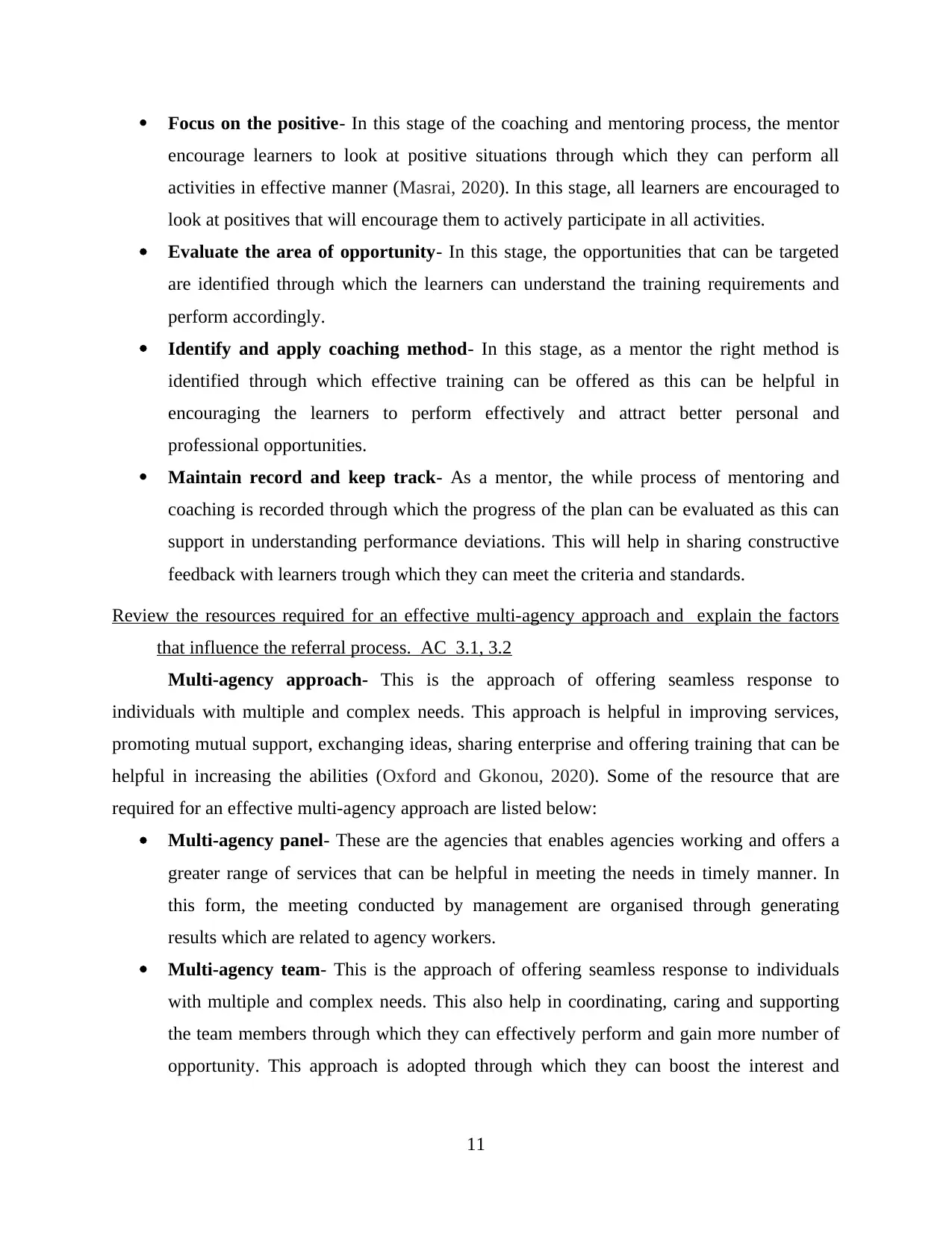
Focus on the positive- In this stage of the coaching and mentoring process, the mentor
encourage learners to look at positive situations through which they can perform all
activities in effective manner (Masrai, 2020). In this stage, all learners are encouraged to
look at positives that will encourage them to actively participate in all activities.
Evaluate the area of opportunity- In this stage, the opportunities that can be targeted
are identified through which the learners can understand the training requirements and
perform accordingly.
Identify and apply coaching method- In this stage, as a mentor the right method is
identified through which effective training can be offered as this can be helpful in
encouraging the learners to perform effectively and attract better personal and
professional opportunities.
Maintain record and keep track- As a mentor, the while process of mentoring and
coaching is recorded through which the progress of the plan can be evaluated as this can
support in understanding performance deviations. This will help in sharing constructive
feedback with learners trough which they can meet the criteria and standards.
Review the resources required for an effective multi-agency approach and explain the factors
that influence the referral process. AC 3.1, 3.2
Multi-agency approach- This is the approach of offering seamless response to
individuals with multiple and complex needs. This approach is helpful in improving services,
promoting mutual support, exchanging ideas, sharing enterprise and offering training that can be
helpful in increasing the abilities (Oxford and Gkonou, 2020). Some of the resource that are
required for an effective multi-agency approach are listed below:
Multi-agency panel- These are the agencies that enables agencies working and offers a
greater range of services that can be helpful in meeting the needs in timely manner. In
this form, the meeting conducted by management are organised through generating
results which are related to agency workers.
Multi-agency team- This is the approach of offering seamless response to individuals
with multiple and complex needs. This also help in coordinating, caring and supporting
the team members through which they can effectively perform and gain more number of
opportunity. This approach is adopted through which they can boost the interest and
11
encourage learners to look at positive situations through which they can perform all
activities in effective manner (Masrai, 2020). In this stage, all learners are encouraged to
look at positives that will encourage them to actively participate in all activities.
Evaluate the area of opportunity- In this stage, the opportunities that can be targeted
are identified through which the learners can understand the training requirements and
perform accordingly.
Identify and apply coaching method- In this stage, as a mentor the right method is
identified through which effective training can be offered as this can be helpful in
encouraging the learners to perform effectively and attract better personal and
professional opportunities.
Maintain record and keep track- As a mentor, the while process of mentoring and
coaching is recorded through which the progress of the plan can be evaluated as this can
support in understanding performance deviations. This will help in sharing constructive
feedback with learners trough which they can meet the criteria and standards.
Review the resources required for an effective multi-agency approach and explain the factors
that influence the referral process. AC 3.1, 3.2
Multi-agency approach- This is the approach of offering seamless response to
individuals with multiple and complex needs. This approach is helpful in improving services,
promoting mutual support, exchanging ideas, sharing enterprise and offering training that can be
helpful in increasing the abilities (Oxford and Gkonou, 2020). Some of the resource that are
required for an effective multi-agency approach are listed below:
Multi-agency panel- These are the agencies that enables agencies working and offers a
greater range of services that can be helpful in meeting the needs in timely manner. In
this form, the meeting conducted by management are organised through generating
results which are related to agency workers.
Multi-agency team- This is the approach of offering seamless response to individuals
with multiple and complex needs. This also help in coordinating, caring and supporting
the team members through which they can effectively perform and gain more number of
opportunity. This approach is adopted through which they can boost the interest and
11
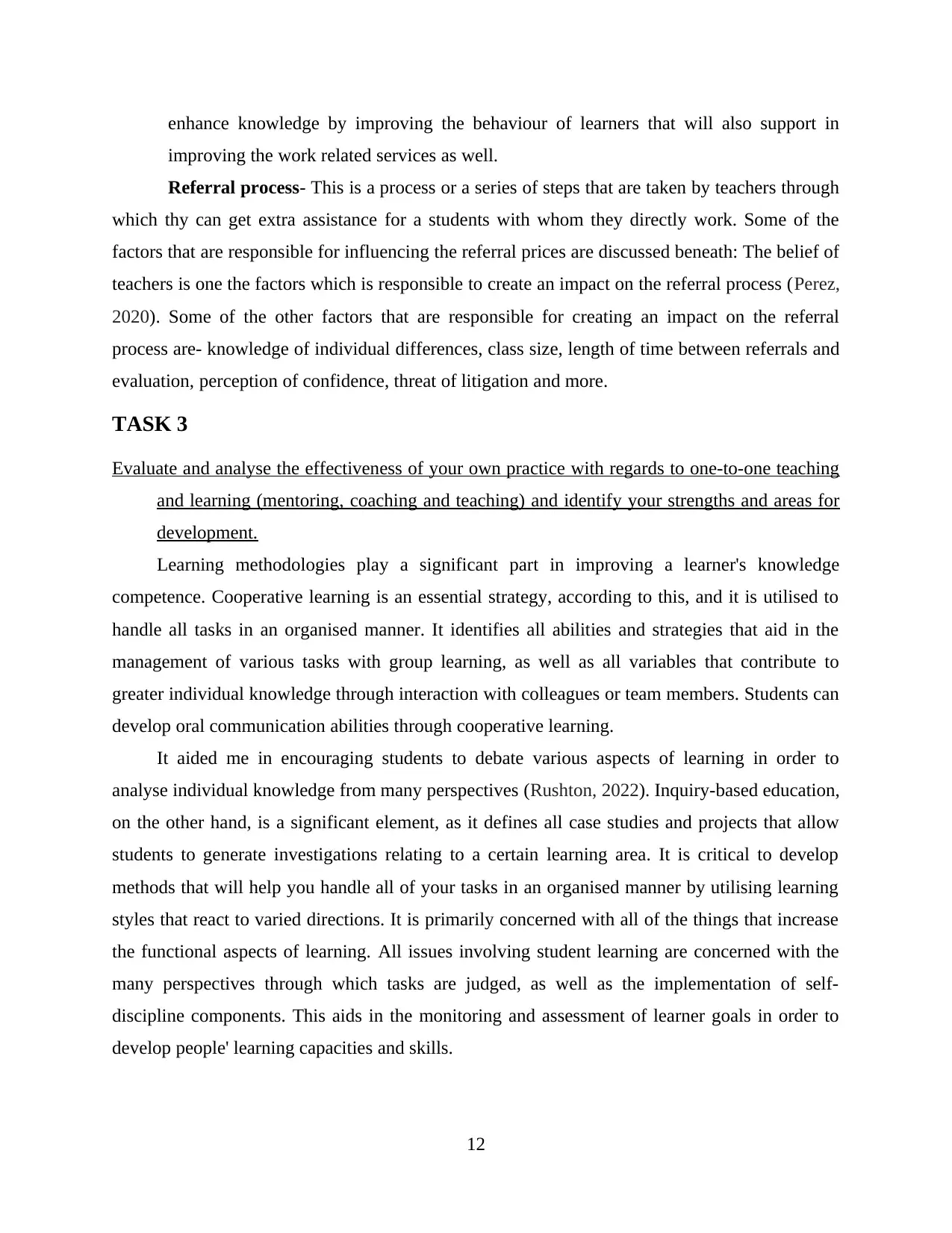
enhance knowledge by improving the behaviour of learners that will also support in
improving the work related services as well.
Referral process- This is a process or a series of steps that are taken by teachers through
which thy can get extra assistance for a students with whom they directly work. Some of the
factors that are responsible for influencing the referral prices are discussed beneath: The belief of
teachers is one the factors which is responsible to create an impact on the referral process (Perez,
2020). Some of the other factors that are responsible for creating an impact on the referral
process are- knowledge of individual differences, class size, length of time between referrals and
evaluation, perception of confidence, threat of litigation and more.
TASK 3
Evaluate and analyse the effectiveness of your own practice with regards to one-to-one teaching
and learning (mentoring, coaching and teaching) and identify your strengths and areas for
development.
Learning methodologies play a significant part in improving a learner's knowledge
competence. Cooperative learning is an essential strategy, according to this, and it is utilised to
handle all tasks in an organised manner. It identifies all abilities and strategies that aid in the
management of various tasks with group learning, as well as all variables that contribute to
greater individual knowledge through interaction with colleagues or team members. Students can
develop oral communication abilities through cooperative learning.
It aided me in encouraging students to debate various aspects of learning in order to
analyse individual knowledge from many perspectives (Rushton, 2022). Inquiry-based education,
on the other hand, is a significant element, as it defines all case studies and projects that allow
students to generate investigations relating to a certain learning area. It is critical to develop
methods that will help you handle all of your tasks in an organised manner by utilising learning
styles that react to varied directions. It is primarily concerned with all of the things that increase
the functional aspects of learning. All issues involving student learning are concerned with the
many perspectives through which tasks are judged, as well as the implementation of self-
discipline components. This aids in the monitoring and assessment of learner goals in order to
develop people' learning capacities and skills.
12
improving the work related services as well.
Referral process- This is a process or a series of steps that are taken by teachers through
which thy can get extra assistance for a students with whom they directly work. Some of the
factors that are responsible for influencing the referral prices are discussed beneath: The belief of
teachers is one the factors which is responsible to create an impact on the referral process (Perez,
2020). Some of the other factors that are responsible for creating an impact on the referral
process are- knowledge of individual differences, class size, length of time between referrals and
evaluation, perception of confidence, threat of litigation and more.
TASK 3
Evaluate and analyse the effectiveness of your own practice with regards to one-to-one teaching
and learning (mentoring, coaching and teaching) and identify your strengths and areas for
development.
Learning methodologies play a significant part in improving a learner's knowledge
competence. Cooperative learning is an essential strategy, according to this, and it is utilised to
handle all tasks in an organised manner. It identifies all abilities and strategies that aid in the
management of various tasks with group learning, as well as all variables that contribute to
greater individual knowledge through interaction with colleagues or team members. Students can
develop oral communication abilities through cooperative learning.
It aided me in encouraging students to debate various aspects of learning in order to
analyse individual knowledge from many perspectives (Rushton, 2022). Inquiry-based education,
on the other hand, is a significant element, as it defines all case studies and projects that allow
students to generate investigations relating to a certain learning area. It is critical to develop
methods that will help you handle all of your tasks in an organised manner by utilising learning
styles that react to varied directions. It is primarily concerned with all of the things that increase
the functional aspects of learning. All issues involving student learning are concerned with the
many perspectives through which tasks are judged, as well as the implementation of self-
discipline components. This aids in the monitoring and assessment of learner goals in order to
develop people' learning capacities and skills.
12
⊘ This is a preview!⊘
Do you want full access?
Subscribe today to unlock all pages.

Trusted by 1+ million students worldwide
1 out of 16
Related Documents
Your All-in-One AI-Powered Toolkit for Academic Success.
+13062052269
info@desklib.com
Available 24*7 on WhatsApp / Email
![[object Object]](/_next/static/media/star-bottom.7253800d.svg)
Unlock your academic potential
Copyright © 2020–2026 A2Z Services. All Rights Reserved. Developed and managed by ZUCOL.





